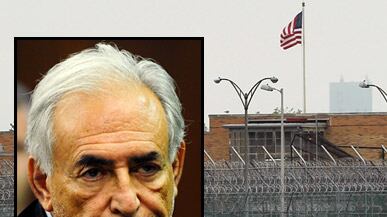There’s an old saying common among grifters, counterfeiters, bank robbers, and assorted other ne’er-do-wells—that “catchin’ comes before hangin.’ ” This thought has to be careening through Dominique Strauss-Kahn’s mind as he sits alone on his bunk in his single cell on Rikers Island … with nothing to do but think. Been there, done that.

Never mind the confident-sounding proclamations emanating from his phalanx of high-powered attorneys who are currently grasping at every straw imaginable: Their client was set up by political enemies; he has an alibi ( a long dinner with his daughter); the hotel employee consented … but in the end, if all of their strategies fail, Strauss-Kahn alone is the one who will be perp-walked out of the courtroom to spend perhaps the rest of his life behind bars. The highly compensated mouthpieces will get to go back to their offices or homes and wait for the next case.
At age 62, even a 15-year sentence would be tantamount to life for Strauss-Kahn. And the higher the perch from which someone falls, the bigger the thud he makes when he splatters on the concrete of reality. And unlike Bernie Madoff, who’s in prison for financial crimes, Strauss-Kahn, if convicted, would be—in spite of his prior wealth or status—at the bottom of the jailhouse pecking order. The simple fact is, too many men behind bars have a family member (or know of someone, perhaps someone close) who’s been sexually abused. And the inequality of wealth and power between the alleged perpetrator and the victim certainly would not be overlooked by fellow prisoners. Strauss-Kahn had (and still has) multiple reasons to flee, and virtually no reasons to stay and face the music that will be played by a potentially unsympathetic ensemble.
But living on the lam—always looking out the window at every vehicle that slows down, constantly glancing over your shoulder, as nervous as a "ho in church”—is no fun. I know from personal experience. It can wear your nerves down to a nub—it’s like 50-grit sandpaper on the psyche. You tense at the sight of every police car, jump at every sound, scan the faces of total strangers for any clue or hint of recognition, and paranoia soon becomes your constant companion. The stress, compounded by fitful rest and sleepless nights, ages you quickly.
Even in the best of situations, all sense of normalcy is left behind when you’re on the lam. As a career counterfeiter of credit cards, I didn't find money or ID much of a problem, but trust always was. My first line of defense was movement. I didn’t stay put in one place for very long, the thinking being that “a moving target is harder to hit.”
But I was a much younger man than Strauss-Kahn in those days, and it’s doubtful that, were he to flee, he would move about. He would most likely remain stationary in an exclusive villa somewhere (sound familiar?) but, in the end, it still comes down to the same thing: who to trust. His life and freedom would be exclusively in the hands of others—not a very comfortable situation for someone once so powerful.
But it’s always the trust (or lack thereof), the loneliness, and the paranoia that constantly eats away at you like a cancer, that does you in. When I was finally apprehended after years on the lam I was so relieved I slept virtually nonstop for the first two weeks.
While in America the presumption of innocence is granted to all who appear before the bar of justice, citizens and foreign nationals alike, the treatment Strauss-Kahn initially received at the hands of Judge Melissa Jackson (the denying of bail) has got to make the defendant wonder if it’s possible to receive a fair trial in such a high-profile, ugly case. However, except in capital-murder cases, bail is virtually always granted … but it might take an appeal to a higher court in this case.
The fear that has to be palpable within the criminal-justice machinery in New York City has to be “What if he runs and we can’t get him back into this country to stand trial?” The Roman Polanski incident is still far too fresh in many minds. And no elected official—judge or prosecutor—is going to be eager to allow someone of this caliber to slip through their fingers. This is an opportunity for someone to either be a hero or a goat. Entire political careers can be built (or destroyed) off cases like the one at hand.
A million-dollar bail might sound like a lot of money, but in the case of a man who probably has access to tens of millions of dollars if necessary, there really is no amount that assures Strauss-Kahn’s appearance in a New York courtroom if he makes up his mind he doesn’t want to roll the legal dice on the rest of his life. Of course, his lawyers are probably assuring him they’ve “got it handled” and to “stay and fight,” but what else are they going to say? If Strauss-Kahn makes like “a turkey through the corn,” how are they going to get paid, and perhaps get famous in the process?
It’s a big world out there, and taking someone’s passport only means he cannot clear customs—it certainly doesn’t mean Strauss-Kahn can’t “ghost” by other means. Small planes, flying under radar, land and take off from clandestine airstrips all over coastal areas of most countries—including the U.S.—with regularity and impunity. And then there are always boats. Hell, last year Colombian officials discovered a 100-foot homemade operational submarine that was being prepared for drug smuggling.
But governments don’t like to talk about the borders they can’t adequately patrol, control, and secure. Guns, drugs, and, yes, people move around the globe with more ease than most of us can imagine … as long as one has the means to pay for the illicit transportation service. Think of it merely as another knotty problem of logistics to be solved. All it takes is money, and Strauss-Kahn (and his legion of supporters) has plenty of that.
Another thing law enforcement doesn’t like to talk about are the ones—like the legendary D. B. Cooper—who got away. As deterrence to more accused individuals taking “French leave” (how appropriate a term in this case), the myth is maintained that, similar to the Canadian Mounties, the police “always get their man.” Not only does law enforcement sometimes fail to get its man; in most cases, when it fails and the trail goes cold, it doesn’t even pursue its man all that much.
Living on the lam—always looking out the window at every vehicle that slows down, constantly glancing over your shoulder, as nervous as a "ho in church”—is no fun.
Why? As previously stated, it’s a big world out there. If the wanted person is a professional criminal, law-enforcement agencies rely mostly on informants, and in the case of amateurs, they rely mostly on loneliness. They wait. Agencies know from experience that their best bet is not to actively look for the absconder, but to wait and watch family members. Sooner or later most individuals on the lam will get lonely, will begin to miss family, and eventually will try to make contact. So they simply wait … for years, decades even, if necessary.
To successfully live on the lam requires a complete change—of habits, familiarity, and even personality; something most people can’t do quickly, at a moment’s notice, if at all. Old habits die hard, that’s what trips most people up—and law enforcement knows it.
And if Strauss-Kahn does decide to flee, as the bin Laden incident recently taught us, he should not place any faith in the sanctity of borders, or think he’s safe in a country that has no extradition treaty with the U.S. If the U.S. government wants someone badly enough, international treaties don’t mean anything at all. The feds have a saying for those types of situations where lawbreaking is required: “badly captured, well held.”
Apologists for this alleged rapist are already setting the table for his disappearance by fault-finding the American system of jurisprudence. They will of course claim that Strauss-Kahn had little recourse, faced with being judged by a legal system that some charge as being capricious and often unjust … one that allows Lady Justice to sometimes peek out from under her blindfold. Sometimes “catchin,’ ” indeed, does come before “hangin.’ ” But, in the end, it comes down to a simple matter of which type of prison you want to reside in.
Mansfield Frazier is a native Clevelander and former newspaper editor. His regular column can be seen on CoolCleveland.com. An avid gardener, he resides in the Hough neighborhood of Cleveland with his wife, Brenda, and their two dogs, Gypsy and Ginger.





